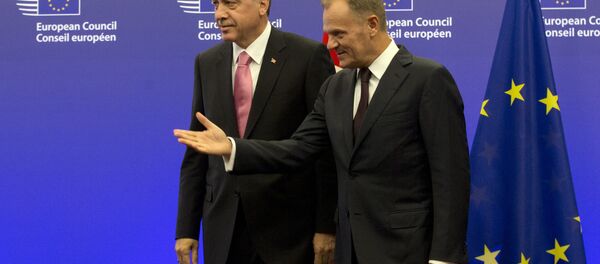On Wednesday, lawyers for US Army Captain Nathan Smith, a military intelligence officer, filed a lawsuit against US President Obama, arguing that the conflict against Daesh constitutes an illegal war, without congressional authorization, in contravention to the 1973 War Powers Act.
The 28-year-old Army officer was deployed to Kuwait last fall with the Combined Joint Task Force Operation mission Inherent Resolve, which is responsible for overseeing the fight against Daesh.
According to court documents, Smith does not morally object to fighting Daesh, a group he considers to be "an army of butchers," and asserts that combating terrorism "is why I signed up to be part of the military."
However, Smith initiated the lawsuit "out of conscience because fighting an illegal war forces him to violate his oath to ‘preserve, protect, and defend’ the Constitution."
White House and Pentagon officials have long claimed to have sufficient legal authority to conduct the ongoing fight against Daesh under the umbrella of a loose interpretation of the 2001 Authorization of the Use of Military Force (AUMF), granted by Congress for use in the conflict against al-Qaeda, under the claim that Daesh is an offshoot of the older extremist group.
In December 2015, White House Press Secretary Josh Earnest reaffirmed this position stating that, "Right now, the President has the legal authority that he needs under the 2001 AUMF that Congress passed."
Constitutional and international law scholars worry that the White House is stretching a precedent for the right to engage in a never-ending war, and claim that the Obama administration must return to Congress for authorization to continue the conflict.
The drumbeat to follow the traditional protocol of requesting support for combat missions from Congress has grown louder, as the campaign against Daesh morphs from airstrikes to deployed trainers to special operations search-and-kill squads on the ground. On Tuesday, one of those recently deployed troops, 31-year-old Navy SEAL Charles Keating IV, was killed in a firefight with Daesh extremists in Northern Iraq.
Does the White House have the authority to continue the conflict against Daesh?
The War Powers Act, passed in 1973 by a two-thirds majority of both the US House of Representatives and US Senate over the veto of then-President Richard Nixon, provides that a US President can only dispatch forces into a conflict abroad through a declaration of war by Congress, or by "a national emergency created by attack upon the United States, its territories or possessions, or its armed forces."
The law further provides that the White House cannot commit troops for more than 60 days, including a further 30 day withdrawal period, without Congressional authorization for use of military force or a declaration of war.
During the second Bush administration, legal scholars quipped that the War Powers Act was unconstitutional at its inception, because it improperly limits the commander-in-chief authority of the President, provided in the US Constitution. Scholars argue that Congress in 1973 should have advanced a Constitutional amendment, rather than a statutory change.
That interpretation is given credence by the Supreme Court’s reticence to hear cases related to the War Powers Act under the "Political Question" doctrine, wherein the courts say it is for Congress and the White House to sort out, between themselves or through the electoral process. The Obama administration notably refutes this interpretation, claiming that they are bound by the War Powers Act, arguing that it is a necessary check on executive authority.
However, the Obama administration argues that the 2001 AUMF extends to the present day, despite today’s conflict being of a different nature than would have been contemplated by Congress at the time they voted to approve military force.
This argument, that the 2001 AUMF extends to the present day, rests upon a White House interpretation of a 1952 Supreme Court precedent. The administration reasons that Congress accepted their interpretation that the 2001 AUMF remains in force, by approving a military budget that implies ongoing war.
Nonetheless, Smith’s case suggests that this interpretation can be stretched to justify perpetual war without geographic bounds and should be illegal. One of his attorneys, Yale Law Professor Bruce Ackerman, argues that the Obama administration places troops in a bind — soldiers are legally bound to disobey unlawful orders, but, when the law is stretched by the administration, how do they reasonably determine what orders are lawful and unlawful?
On Thursday, White House Press Secretary Josh Earnest placed blame for the controversy at the feet of the Republican Congress, in failing to advance a new authorization for the use of military force (AUMF) that specifies Daesh. "This is another example of Congress dropping the ball," said Earnest.







